高考英语新课标全国卷三(供参考)
2019年全国卷Ⅲ高考英语试题文档版(附答案)【精品版】

绝密★启用前2019年普通高等学校招生全国统一考试(全国卷III)英语注意事项:1.答卷前,考生务必将自己的姓名、准考证号填写在答题卡上。
2.回答选择题时,选出每小题答案后,用铅笔把答题卡上对应题目的答案标号涂黑。
如需改动,用橡皮擦干净后,再选涂其他答案标号。
回答非选择题时,将答案写在答题卡上,写在本试卷上无效。
3.考试结束后,将本试卷和答题卡一并交回。
第一部分听力(共两节,满分30分)做题时,先将答案标在试卷上。
录音内容结束后,你将有两分钟的时间将试卷上的答案转涂到答题卡上。
第一节(共5小题;每小题1.5分,满分7.5分)听下面5段对话。
每段对话后有一个小题,从题中所给的A、B、C三个选项中选出最佳选项。
听完每段对话后,你都有10秒钟的时间来回答有关小题和阅读下一小题。
每段对话仅读一遍。
例:How much is the shirt?A. £19.15.B. £9.18.C. £9.15.答案是C。
第一节(共5小题;每小题1.5分,满分7.5分)听下面5段对话。
每段对话后有一个小题,从题中所给的A、B、C三个选项中选出最佳选项。
听完每段对话后,你都有10秒钟的时间来回答有关小题和阅读下一小题。
每段对话仅读一遍。
例:How much is the shirt?A. £19.15.B. £9.18.C. £9.15.答案是C。
1. Where does the conversation probably take place?A. In a library.B. In a bookstore.C. In a classroom.2. How does the woman feel now?A. Relaxed.B. Excited.C. Tired.3. How much will the man pay?A. $520.B. $80.C. $100.4. What does the man tell Jane to do?A. Postpone his appointment.B. Meet Mr. Douglas.C. Return at 3o’clock.5. Why would David quit his job?A. To go back to school.B. To start his own firm.C. To work for his friend.第二节(共15小题;每小题1.5分,满分22.5分)听下面5段对话或独白。
2020年高考英语试卷听力+原文+答案(新课标Ⅱ、Ⅲ)
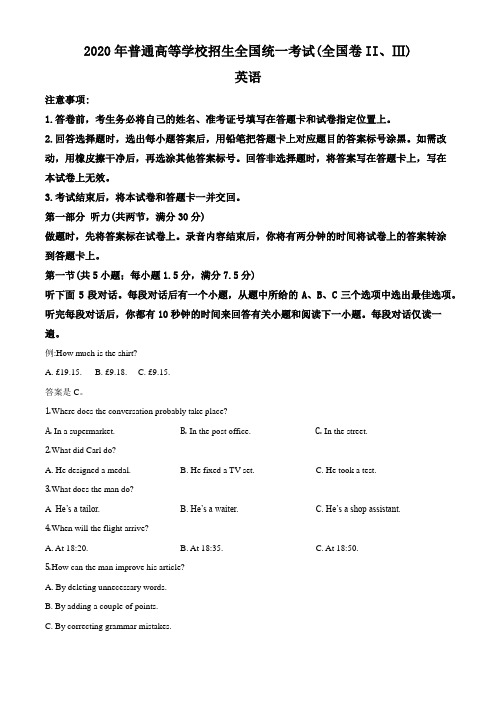
2020年普通高等学校招生全国统一考试(全国卷II、Ⅲ)英语注意事项:1.答卷前,考生务必将自己的姓名、准考证号填写在答题卡和试卷指定位置上。
2.回答选择题时,选出每小题答案后,用铅笔把答题卡上对应题目的答案标号涂黑。
如需改动,用橡皮擦干净后,再选涂其他答案标号。
回答非选择题时,将答案写在答题卡上,写在本试卷上无效。
3.考试结束后,将本试卷和答题卡一并交回。
第一部分听力(共两节,满分30分)做题时,先将答案标在试卷上。
录音内容结束后,你将有两分钟的时间将试卷上的答案转涂到答题卡上。
第一节(共5小题;每小题1.5分,满分7.5分)听下面5段对话。
每段对话后有一个小题,从题中所给的A、B、C三个选项中选出最佳选项。
听完每段对话后,你都有10秒钟的时间来回答有关小题和阅读下一小题。
每段对话仅读一遍。
例:How much is the shirt?A. £19.15.B. £9.18.C. £9.15.答案是C。
1.Where does the conversation probably take place?A. In a supermarket.B. In the post office.C. In the street.2.What did Carl do?A. He designed a medal.B. He fixed a TV set.C. He took a test.3.What does the man do?A He’s a tailor. B. He’s a waiter. C. He’s a shop assistant.4.When will the flight arrive?A. At 18:20.B. At 18:35.C. At 18:50.5.How can the man improve his article?A. By deleting unnecessary words.B. By adding a couple of points.C. By correcting grammar mistakes.第二节(共15小题;每小题1.5分,满分22.5分)听下面5段对话或独白。
2017年新课标全国卷Ⅲ英语3卷高考试题Word文档版(含答案)
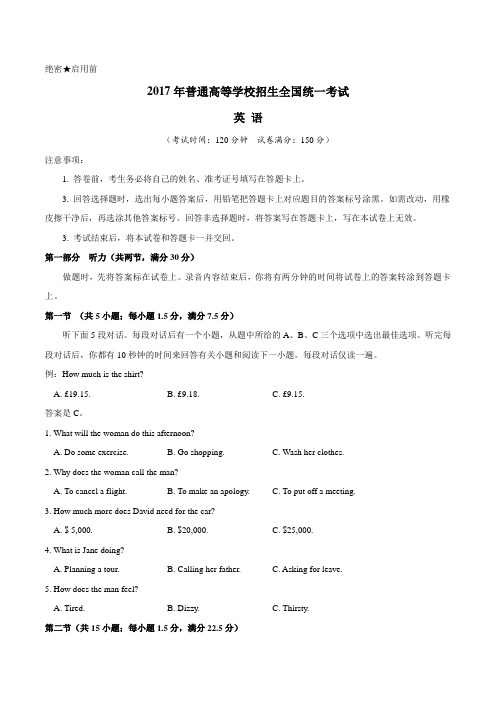
绝密★启用前2017年普通高等学校招生全国统一考试英语(考试时间:120分钟试卷满分:150分)注意事项:1. 答卷前,考生务必将自己的姓名、准考证号填写在答题卡上。
3. 回答选择题时,选出每小题答案后,用铅笔把答题卡上对应题目的答案标号涂黑。
如需改动,用橡皮擦干净后,再选涂其他答案标号。
回答非选择题时,将答案写在答题卡上,写在本试卷上无效。
3. 考试结束后,将本试卷和答题卡一并交回。
第一部分听力(共两节,满分30分)做题时,先将答案标在试卷上。
录音内容结束后,你将有两分钟的时间将试卷上的答案转涂到答题卡上。
第一节(共5小题;每小题1.5分,满分7.5分)听下面5段对话。
每段对话后有一个小题,从题中所给的A、B、C三个选项中选出最佳选项。
听完每段对话后,你都有10秒钟的时间来回答有关小题和阅读下一小题。
每段对话仅读一遍。
例:How much is the shirt?A. £19.15.B. £9.18.C. £9.15.答案是C。
1. What will the woman do this afternoon?A. Do some exercise.B. Go shopping.C. Wash her clothes.2. Why does the woman call the man?A. To cancel a flight.B. To make an apology.C. To put off a meeting.3. How much more does David need for the car?A. $ 5,000.B. $20,000.C. $25,000.4. What is Jane doing?A. Planning a tour.B. Calling her father.C. Asking for leave.5. How does the man feel?A. Tired.B. Dizzy.C. Thirsty.第二节(共15小题;每小题1.5分,满分22.5分)听下面5段对话或独白。
2020年全国卷Ⅲ英语高考试题及答案(word版)
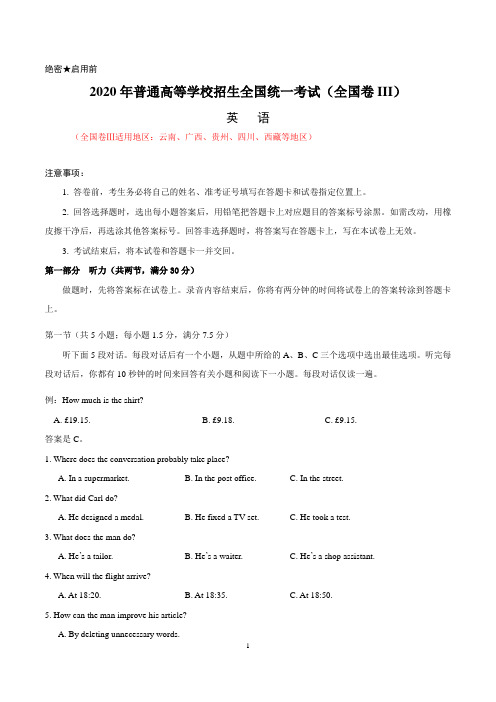
绝密★启用前2020年普通高等学校招生全国统一考试(全国卷III)英语(全国卷Ⅲ适用地区:云南、广西、贵州、四川、西藏等地区)注意事项:1. 答卷前,考生务必将自己的姓名、准考证号填写在答题卡和试卷指定位置上。
2. 回答选择题时,选出每小题答案后,用铅笔把答题卡上对应题目的答案标号涂黑。
如需改动,用橡皮擦干净后,再选涂其他答案标号。
回答非选择题时,将答案写在答题卡上,写在本试卷上无效。
3. 考试结束后,将本试卷和答题卡一并交回。
第一部分听力(共两节,满分30分)做题时,先将答案标在试卷上。
录音内容结束后,你将有两分钟的时间将试卷上的答案转涂到答题卡上。
第一节(共5小题;每小题1.5分,满分7.5分)听下面5段对话。
每段对话后有一个小题,从题中所给的A、B、C三个选项中选出最佳选项。
听完每段对话后,你都有10秒钟的时间来回答有关小题和阅读下一小题。
每段对话仅读一遍。
例:How much is the shirt?A. £19.15.B. £9.18.C. £9.15.答案是C。
1. Where does the conversation probably take place?A. In a supermarket.B. In the post office.C. In the street.2. What did Carl do?A. He designed a medal.B. He fixed a TV set.C. He took a test.3. What does the man do?A. He’s a tailor.B. He’s a waiter.C. He’s a shop assistant.4. When will the flight arrive?A. At 18:20.B. At 18:35.C. At 18:50.5. How can the man improve his article?A. By deleting unnecessary words.B. By adding a couple of points.C. By correcting grammar mistakes.第二节(共15小题;每小题1.5分,满分22.5分)听下面5段对话或独白。
2020年高考全国卷Ⅲ英语(含答案)

2020年高考全国卷Ⅲ英语(含答案)-CAL-FENGHAI-(2020YEAR-YICAI)_JINGBIAN绝密★启用前2020年普通高等学校招生全国统一考试(全国卷III)英语注意事项:1. 答卷前,考生务必将自己的姓名、准考证号填写在答题卡和试卷指定位置上。
2. 回答选择题时,选出每小题答案后,用铅笔把答题卡上对应题目的答案标号涂黑。
如需改动,用橡皮擦干净后,再选涂其他答案标号。
回答非选择题时,将答案写在答题卡上,写在本试卷上无效。
3. 考试结束后,将本试卷和答题卡一并交回。
第一部分听力(共两节,满分30分)做题时,先将答案标在试卷上。
录音内容结束后,你将有两分钟的时间将试卷上的答案转涂到答题卡上。
第一节(共5小题;每小题1.5分,满分7.5分)听下面5段对话。
每段对话后有一个小题,从题中所给的A、B、C三个选项中选出最佳选项。
听完每段对话后,你都有10秒钟的时间来回答有关小题和阅读下一小题。
每段对话仅读一遍。
例:How much is the shirtA. £19.15.B. £9.18.C. £9.15.答案是C。
1. Where does the conversation probably take place?A. In a supermarket.B. In the post office.C. In the street.2. What did Carl do?A. He designed a medal.B. He fixed a TV set.C. He took a test.3. What does the man do?A. He’s a tailor.B. He’s a waiter.C. He’s ashop assistant.4. When will the flight arrive?A. At 18:20.B. At 18:35.C. At18:50.5. How can the man improve his article?A. By deleting unnecessary words.B. By adding a couple of points.C. By correcting grammar mistakes.第二节(共15小题;每小题1.5分,满分22.5分)听下面5段对话或独白。
2019年高考英语全国卷3(附参考答案及详解)
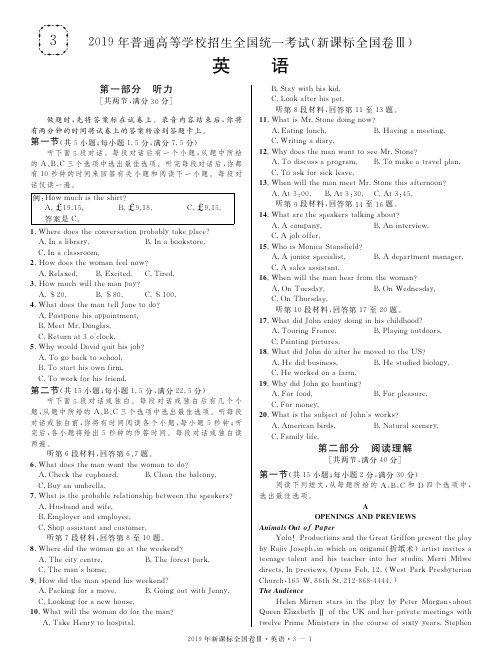
;643G<674 H63<G 3<EA06<16; HF +23<>"4-/6 -E 526 H645
;643G<674-E1-<56/@-7>7FE>423-< >76526/46A=64 +23<646'
-_67> :><G&)A6K><;67 :><G&C>4-<ห้องสมุดไป่ตู้:0 >76 5>?3<G -<
"#':2312@A>F.3AAF-0G-5-3EF-0>763<5676456;3<)/6731><
2345-7F*
)'2*'$)&#;9("3<)%45=
*'+,4291'4*:4=
+'>)$'&("*=
N';*(,4+?4*('4(,!4*(95@=
I
]-7 :64567<;643G<674&+23<>><;354731210A50762>=6
W>AA3><-&)AH>^&T>71C>1-H4"><;H6>53<G526/ 2><;4;-.<
#',-. /012.3AA526/><@>F*
)'Z!"'
*'Z9"' +'Z#""'
2019年全国卷Ⅲ英语高考试题文档版含答案(Word版下载)

2019年普通高等学校招生全国统一考试(全国卷III)英语注意事项:1.答卷前,考生务必将自己的姓名、准考证号填写在答题卡上。
2.回答选择题时,选出每小题答案后,用铅笔把答题卡上对应题目的答案标号涂黑。
如需改动,用橡皮擦干净后,再选涂其他答案标号。
回答非选择题时,将答案写在答题卡上,写在本试卷上无效。
3.考试结束后,将本试卷和答题卡一并交回。
第一部分听力(共两节,满分30分)做题时,先将答案标在试卷上。
录音内容结束后,你将有两分钟的时间将试卷上的答案转涂到答题卡上。
第一节(共5小题;每小题1.5分,满分7.5分)听下面5段对话。
每段对话后有一个小题,从题中所给的A、B、C三个选项中选出最佳选项。
听完每段对话后,你都有10秒钟的时间来回答有关小题和阅读下一小题。
每段对话仅读一遍。
例:How much is the shirt?A. £19.15.B. £9.18.C. £9.15.答案是C。
第一节(共5小题;每小题1.5分,满分7.5分)听下面5段对话。
每段对话后有一个小题,从题中所给的A、B、C三个选项中选出最佳选项。
听完每段对话后,你都有10秒钟的时间来回答有关小题和阅读下一小题。
每段对话仅读一遍。
例:How much is the shirt?A. £19.15.B. £9.18.C. £9.15.答案是C。
1. Where does the conversation probably take place?A. In a library.B. In a bookstore.C. In a classroom.2. How does the woman feel now?A. Relaxed.B. Excited.C. Tired.3. How much will the man pay?A. $520.B. $80.C. $100.4. What does the man tell Jane to do?A. Postpone his appointment.B. Meet Mr. Douglas.C. Return at 3 o’clock.5. Why would David quit his job?A. To go back to school.B. To start his own firm.C. To work for his friend.第二节(共15小题;每小题1.5分,满分22.5分)听下面5段对话或独白。
英语高考试题解析全国卷三及英语复习测试试卷
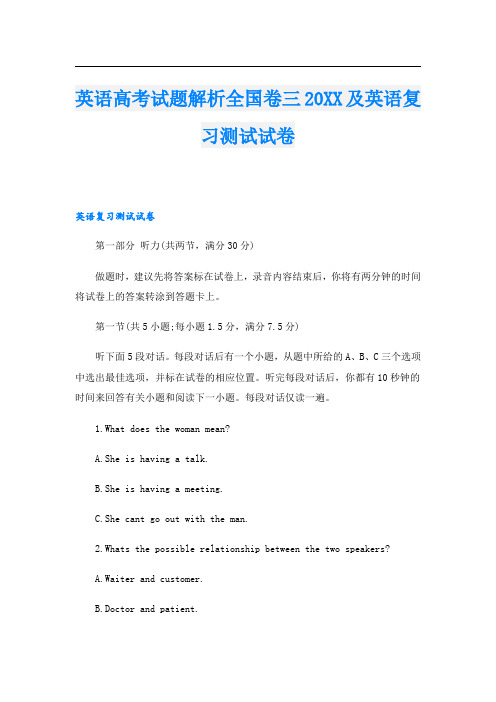
英语高考试题解析全国卷三20XX及英语复习测试试卷英语复习测试试卷第一部分听力(共两节,满分30分)做题时,建议先将答案标在试卷上,录音内容结束后,你将有两分钟的时间将试卷上的答案转涂到答题卡上。
第一节(共5小题;每小题1.5分,满分7.5分)听下面5段对话。
每段对话后有一个小题,从题中所给的A、B、C三个选项中选出最佳选项,并标在试卷的相应位置。
听完每段对话后,你都有10秒钟的时间来回答有关小题和阅读下一小题。
每段对话仅读一遍。
1.What does the woman mean?A.She is having a talk.B.She is having a meeting.C.She cant go out with the man.2.Whats the possible relationship between the two speakers?A.Waiter and customer.B.Doctor and patient.C.Teacher and student3.How much did the man pay?A.2.B.6.C.7.4.Where was Shelia born?A.In China.B.In Japan.C.In America.5.When will the plane take off?A.At 10:30.B.At 10:50.C.At 10:20.第二节(共15小题;每小题1.5分,满分22.5分)听下面5段对话或独白。
每段对话或独白后有几个小题。
从题中所给的A、B、C三个选项中选出最佳选项,并标在试卷的相应位置。
听每段对话或独白前,你将有时间阅读各个小题,每小题5秒钟;听完后,各小题给出5秒钟的作答时间。
每段对话或独白读两遍。
听下面一段对话,回答第6和第7两个小题。
6.What is the possible relationship between the two speakers?A.Teacher and student.B.Mother and son.C.Classmates.7.What will most probably happen next?A.Tony will throw the paper on the floor.B.Bill will put all his paper in the basket.C.Bill will go out to empty the basket.听下面一段对话,回答第8至第10三个小题。
2016年英语高考试题全国卷3(含答案)
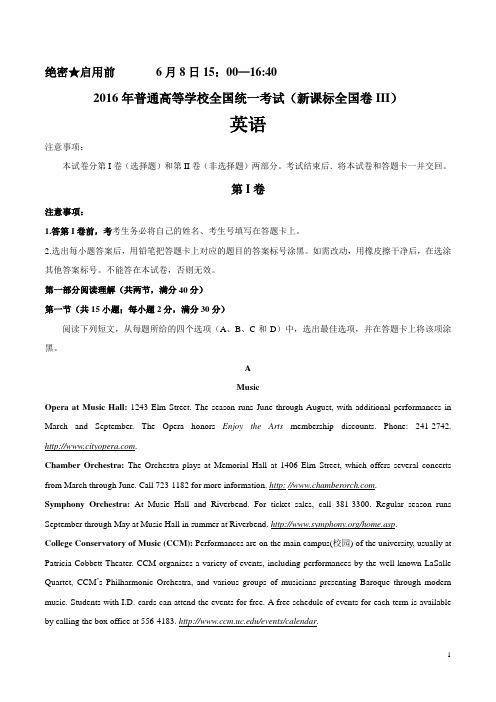
绝密★启用前6月8日15:00—16:402016年普通高等学校全国统一考试(新课标全国卷III)英语注意事项:本试卷分第I卷(选择题)和第II卷(非选择题)两部分。
考试结束后.将本试卷和答题卡一并交回。
第I卷注意事项:1.答第I卷前,考考生务必将自己的姓名、考生号填写在答题卡上。
2.选出每小题答案后,用铅笔把答题卡上对应的题目的答案标号涂黑。
如需改动,用橡皮擦干净后,在选涂其他答案标号。
不能答在本试卷,否则无效。
第一部分阅读理解(共两节,满分40分)第一节(共15小题;每小题2分,满分30分)阅读下列短文,从每题所给的四个选项(A、B、C和D)中,选出最佳选项,并在答题卡上将该项涂黑。
AMusicOpera at Music Hall: 1243 Elm Street. The season runs June through August, with additional performances in March and September. The Opera honors Enjoy the Arts membership discounts. Phone: 241-2742. .Chamber Orchestra: The Orchestra plays at Memorial Hall at 1406 Elm Street, which offers several concerts from March through June. Call 723-1182 for more information. .Symphony Orchestra: At Music Hall and Riverbend. For ticket sales, call 381-3300. Regular season runs September through May at Music Hall in summer at Riverbend. /home.asp.College Conservatory of Music (CCM): Performances are on the main campus(校园) of the university, usually at Patricia Cobbett Theater. CCM organizes a variety of events, including performances by the well-known LaSalle Quartet, CCM’s Philharmonic Orchestra, and various groups of musicians presenting Baroque through modern music. Students with I.D. cards can attend the events for free. A free schedule of events for each term is available by calling the box office at 556-4183. /events/calendar.Riverbend Music Theater: 6295 Kellogg Ave. Large outdoor theater with the closest seats under cover (price difference).Big name shows all summer long! Phone:232-6220. .1. Which number should you call if you want to see an opera?A. 241-2742.B. 723-1182.C. 381-3300.D. 232-6220.2. When can you go to a concert by Chamber Orchestra?A. February.B. May.C. August.D. November.3.Where can students go for free performances with their I.D. cards?A. Music Hall.B. Memorial Hall.C. Patricia Cobbett Theater.D. Riverbend Music Theater.4. How is Riverbend Music Theater different from the other places?A. It has seats in the open air.B. It gives shows all year round.C. It offers membership discounts.D. It presents famous musical works.BOn one of her trips to New York several years ago, Eudora Welty decided to take a couple of New York friends out to dinner. They settled in at a comfortable East Side cafe and within minutes, another customer was approaching their table.“Hey, aren’t you from Mississippi?” the elegant, white-haired writer remembered being asked by the stranger. “I’m from Mississippi too.”Without a second thought, the woman joined the Welty party. When her dinner partner showed up, she also pulled up a chair.“They began telling me all the news of Mississippi,” Welty said. “I didn’t know what my New York friends were thinking.”Taxis on a rainy New York night are rarer than sunshine. By the time the group got up to leave, it was pouring outside. Welty’s new friends immediately sent a waiter to find a cab. Heading back downtown toward her hotel, her big-city friends were amazed at the turn of events that had changed their Big Apple dinner into a Mississippi.“My friends said: ‘Now we believe your stories,’” Welty added. “And I said: ‘Now you know. These are the people that make me write them.’”Sitting on a sofa in her room, Welty, a slim figure in a simple gray dress, looked pleased with this explanation.“I don’t make them up,” she said of the characters in her fiction these last 50 or so years. “I don’t have to.”Beauticians, bartenders, piano players and people with purple hats, Welty’s people come from afternoons spent visiting with old friends, from walks through the streets of her native Jackson, Miss., from conversations overheard on a bus. It annoys Welty that, at 78, her left ear has now given out. Sometimes, sitting on a bus or a train, she hears only a fragment(片段) of a particularly interesting story.5. What happened when Welty was with her friends at the cafe?A. Two strangers joined her.B. Her childhood friends came in.C. A heavy rain ruined the dinner.D. Some people held a party there.6. The underlined word “them” in Paragraph 6 refers to Welty’s .A. readersB. partiesC. friendsD. stories7. What can we learn about the characters in Welty’s fiction?A. They live in big cities.B. They are mostly women.C. They come from real life.D. They are pleasure seekers.CIf you are a fruit grower—or would like to become one—take advantage of Apple Day to see what’s around. It’s called Apple Day but in practice it’s more like Apple Month. The day itself is on October 21, but since it has caught on, events now spread out over most of October around Britain.Visiting an apple event is a good chance to see, and often taste, a wide variety of apples. To people who are used to the limited choice of apples such as Golden Delicious and Royal Gala in supermarkets, it can be quite an eye opener to see the range of classical apples still in existence, such as Decio which was grown by the Romans. Although it doesn’t taste of anything special, it’s still worth a try, as is the knobbly(多疙瘩的) Cat’s Head which is more of a curiosity than anything else.There are also varieties developed to suit specific local conditions. One of the very best varieties for eating quality is Orleans Reinette, but you’ll need a warm, sheltered place with perfect soil to grow it, so it’s a pipe dream for most apple lovers who fall for it.At the events, you can meet expert growers and discuss which ones will best suit your conditions, and because these are family affairs, children are well catered for with apple-themed fun and games.Apple Days are being held at all sorts of places with an interest in fruit, including stately gardens and commercial orchards(果园).If you want to have a real orchard experience, try visiting the National Fruit Collection at Brogdale, near Faversham in Kent.8.What can people do at the apple events?A. Attend experts’ lectures.B. Visit fruit-loving families.C. Plant fruit trees in an orchard.D. Taste many kinds of apples.9.What can we learn about Decio?A. It is a new variety.B. It has a strange look.C. It is rarely seen now.D. It has a special taste.10. What does the underlined phrase “a pipe dream” in Paragraph 3mean?A. A practical idea.B. A vain hope.C.A brilliant plan.D. A selfish desire.11.What is the author’s p urpose in writing the text?A. To show how to grow apples.B .To introduce an apple festival.C. To help people select apples.D. To promote apple research.DBad news sells. If it bleeds, it leads. No news is good news, and good news is no news. Those are the classic rules for the evening broadcasts and the morning papers. But now that information is being spread and monitored(监控) in different ways, researchers are discovering new rules. By tracking people’s e-mails and online posts, scientists have found that good news can spread faster and farther than disasters and sob stories.“The ‘if it bleeds’ rule works for mass media,” says Jonah Berger, a scholar at the University of Pennsylvania. “They want your eyeballs and don’t care how you’re feeling. But when you share a story with your friends, you care a lot more how they react. You don’t want them to think of you as a Debbie Downer.”Researchers analyzing word-of-mouth communication—e-mails, Web posts and reviews, face-to-face conversations—found that it tended to be more positive than negative(消极的), but that didn’t necessarily mean people preferred positive news. Was positive news shared more often simply because people experienced moregood things than bad things? To test for that possibility, Dr. Berger looked at how people spread a particular set of news stories: thousands of articles on The New York Times’ website. He and a Penn colleague analyzed the “most e-mailed” list for six months. One of his fir st findings was that articles in the science section were much more likely to make the list than non-science articles. He found that science amazed Times’ readers and made them want to share this positive feeling with others.Readers also tended to share articles that were exciting or funny, or that inspired negative feelings like anger or anxiety, but not articles that left them merely sad. They needed to be aroused(激发) one way or the other, and they preferred good news to bad. The more positive an article, the more likely it was to be shared, as Dr. Berger explains in his new book, “Contagious: Why Things Catch On.”12 .What do the classic rules mentioned in the text apply to?A. News reports.B. Research papers.C .Private e-mails. D. Daily conversations.13. What can we infer about people like Debbie Downer?A. They’re socially inactive.B. They’re good at telling stories.C. They’re inconsiderate of others.D. They’re careful with their words.14.Which tended to be the most e-mailed according to Dr. Berger’s research?A . Sports new. B. Science articles.C. Personal accounts.D. Financial reviews.15 .What can be a suitable title for the text?A. Sad Stories Travel Far and WideB .Online News Attracts More PeopleC. Reading Habits Change with the TimesD. Good News Beats Bad on Social Networks第二节(共5小题;每小题2分,满分10分)根据短文内容,从短文后的选项中选出能填入空白处的最佳选项。
2017高考英语全国卷三(新课标III)试题与答案(精校版)
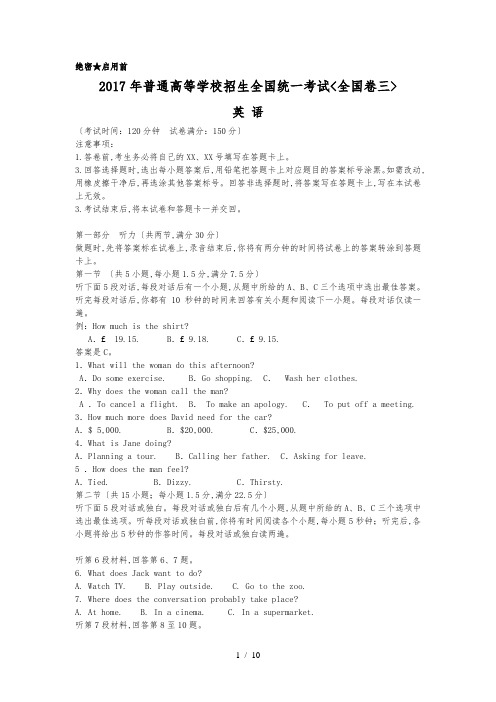
绝密★启用前2017年普通高等学校招生全国统一考试<全国卷三>英语〔考试时间:120分钟试卷满分:150分〕注意事项:1.答卷前,考生务必将自己的XX、XX号填写在答题卡上。
3.回答选择题时,选出每小题答案后,用铅笔把答题卡上对应题目的答案标号涂黑。
如需改动,用橡皮擦干净后,再选涂其他答案标号。
回答非选择题时,将答案写在答题卡上,写在本试卷上无效。
3.考试结束后,将本试卷和答题卡一并交回。
第一部分听力〔共两节,满分30分〕做题时,先将答案标在试卷上,录音结束后,你将有两分钟的时间将试卷上的答案转涂到答题卡上。
第一节〔共5小题,每小题1.5分,满分7.5分〕听下面5段对话,每段对话后有一个小题,从题中所给的A、B、C三个选项中选出最佳答案。
听完每段对话后,你都有10秒钟的时间来回答有关小题和阅读下一小题。
每段对话仅读一遍。
例:How much is the shirt?A.£ 19.15. B.£9.18. C.£9.15.答案是C。
1.What will the woman do this afternoon?A.Do some exercise. B.Go shopping. C. Wash her clothes.2.Why does the woman call the man?A .To cancel a flight. B. To make an apology. C. To put off a meeting. 3.How much more does David need for the car?A.$ 5,000. B.$20,000. C.$25,000.4.What is Jane doing?A.Planning a tour. B.Calling her father. C.Asking for leave.5 .How does the man feel?A.Tied. B.Dizzy. C.Thirsty.第二节〔共15小题;每小题1.5分,满分22.5分〕听下面5段对话或独白。
(word版)新课标全国卷3高考英语试题及答案,文档
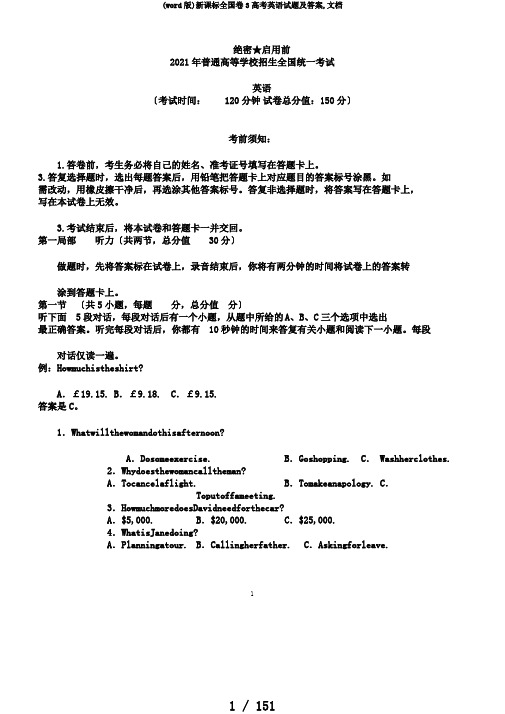
绝密★启用前2021年普通高等学校招生全国统一考试英语〔考试时间:120分钟试卷总分值:150分〕考前须知:1.答卷前,考生务必将自己的姓名、准考证号填写在答题卡上。
3.答复选择题时,选出每题答案后,用铅笔把答题卡上对应题目的答案标号涂黑。
如需改动,用橡皮擦干净后,再选涂其他答案标号。
答复非选择题时,将答案写在答题卡上,写在本试卷上无效。
3.考试结束后,将本试卷和答题卡一并交回。
第一局部听力〔共两节,总分值30分〕做题时,先将答案标在试卷上,录音结束后,你将有两分钟的时间将试卷上的答案转涂到答题卡上。
第一节〔共5小题,每题分,总分值分〕听下面5段对话,每段对话后有一个小题,从题中所给的A、B、C三个选项中选出最正确答案。
听完每段对话后,你都有10秒钟的时间来答复有关小题和阅读下一小题。
每段对话仅读一遍。
例:Howmuchistheshirt?A.£19.15. B.£9.18. C.£9.15.答案是C。
1.Whatwillthewomandothisafternoon?A.Dosomeexercise. B.Goshopping. C. Washherclothes.2.Whydoesthewomancalltheman?A.Tocancelaflight. B.Tomakeanapology. C.Toputoffameeting.3.HowmuchmoredoesDavidneedforthecar?A.$5,000. B.$20,000. C.$25,000.4.WhatisJanedoing?A.Planningatour. B.Callingherfather. C.Askingforleave.15.Howdoesthemanfeel?A.Tied.B.Dizzy.C.Thirsty.第二节〔共15小题;每题分,总分值分〕听下面5段对话或独白。
每段对话或独白后有几个小题,从题中所给的A、B、C三个选项中选出最正确选项。
最新高考英语全国卷3(附答案)
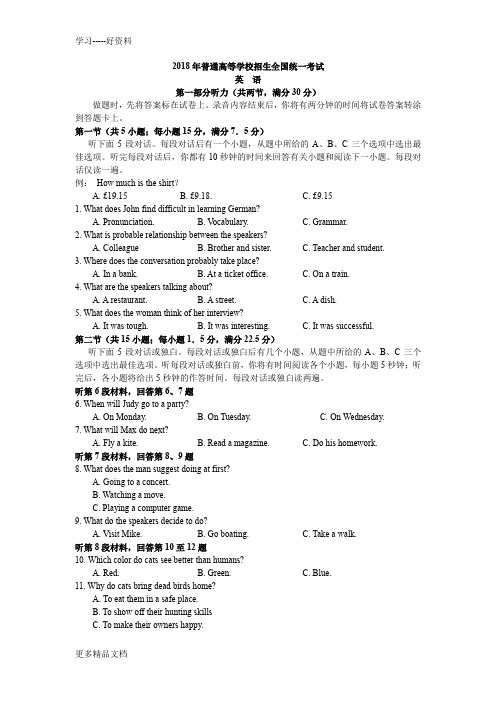
2018年普通高等学校招生全国统一考试英语第一部分听力(共两节,满分30分)做题时,先将答案标在试卷上。
录音内容结東后,你将有两分钟的时间将试卷答案转涂到答题卡上。
第一节(共5小题;每小题15分,满分7.5分)听下面5段对话。
每段对话后有一个小题,从题中所给的A、B、C三个选项中选出最佳选项。
听完每段对话后,你都有10秒钟的时间来回答有关小题和阅读下一小题。
每段对话仅读一遍。
例:How much is the shirt?A. £19.15B. £9.18.C. £9.151. What does John find difficult in learning German?A. Pronunciation.B. V ocabulary.C. Grammar.2. What is probable relationship between the speakers?A. ColleagueB. Brother and sister.C. Teacher and student.3. Where does the conversation probably take place?A. In a bank.B. At a ticket office.C. On a train.4. What are the speakers talking about?A. A restaurant.B. A street.C. A dish.5. What does the woman think of her interview?A. It was tough.B. It was interesting.C. It was successful.第二节(共15小题;每小题1.5分,满分22.5分)听下面5段对话或独白。
每段对话或独白后有几个小题,从题中所给的A、B、C三个选项中选出最佳选项。
2020年高考英语全国卷3及答案

英语试卷第1页(共28页)英语试卷第2页(共28页)绝密★启用前2020年普通高等学校招生全国统一考试·全国Ⅲ卷英语注意事项:1.答卷前,考生务必将自己的姓名、准考证号填写在答题卡和试卷指定位置上。
2.回答选择题时,选出每小题答案后,用铅笔把答题卡上对应题目的答案标号涂黑。
如需改动,用橡皮擦干净后,再选涂其他答案标号。
回答非选择题时,将答案写在答题卡上,写在本试卷上无效。
3.考试结束后,将本试卷和答题卡一并交回。
第一部分听力(共两节,满分30分)做题时,先将答案标在试卷上。
录音内容结束后,你将有两分钟的时间将试卷上的答案转涂到答题卡上。
第一节(共5小题;每小题1.5分,满分7.5分)听下面5段对话。
每段对话后有一个小题,从题中所给的A 、B 、C 三个选项中选出最佳选项。
听完每段对话后,你都有10秒钟的时间来回答有关小题和阅读下一小题。
每段对话仅读一遍。
例:How much is the shirt?A.£19.15.B.£9.18.C.£9.15.答案是C 。
1.Where does the conversation probably take place?A.In a supermarket. B.In the post office.C.In the street.2.What did Carl do?A.He designed a medal. B.He fixed a TV set. C.He took a test.3.What does the man do?A.He’s a tailor.B.He’s a waiter.C.He’s a shop assistant.4.When will the flight arrive?A.At 18:20.B.At 18:35.C.At 18:50.5.How can the man improve his article?A.By deleting unnecessary words.B.By adding a couple of points.C.By correcting grammar mistakes.第二节(共15小题;每小题1.5分,满分22.5分)听下面5段对话或独白。
2020年全国统一高考英语试卷(新课标ⅲ)(含解析版)
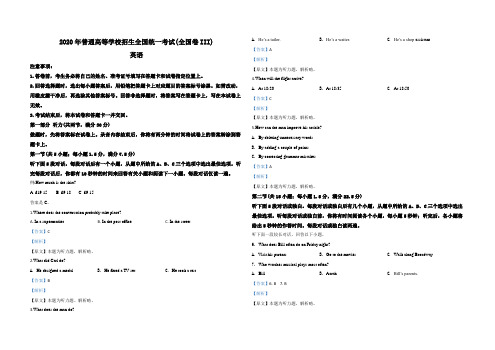
2020年普通高等学校招生全国统一考试(全国卷III)英语注意事项:1.答卷前,考生务必将自己的姓名、准考证号填写在答题卡和试卷指定位置上。
2.回答选择题时,选出每小题答案后,用铅笔把答题卡上对应题目的答案标号涂黑。
如需改动,用橡皮擦干净后,再选涂其他答案标号。
回答非选择题时,将答案写在答题卡上,写在本试卷上无效。
3.考试结束后,将本试卷和答题卡一并交回。
第一部分听力(共两节,满分30分)做题时,先将答案标在试卷上。
录音内容结束后,你将有两分钟的时间将试卷上的答案转涂到答题卡上。
第一节(共5小题;每小题1.5分,满分7.5分)听下面5段对话。
每段对话后有一个小题,从题中所给的A、B、C三个选项中选出最佳选项。
听完每段对话后,你都有10秒钟的时间来回答有关小题和阅读下一小题。
每段对话仅读一遍。
例:How much is the shirt?A. £19.15.B. £9.18.C. £9.15.答案是C。
1.Where does the conversation probably take place?A. In a supermarket.B. In the post office.C. In the street.【答案】C【解析】【原文】本题为听力题,解析略。
2.What did Carl do?A. He designed a medal.B. He fixed a TV set.C. He took a test.【答案】B【解析】【原文】本题为听力题。
解析略。
3.What does the man do? A. He’s a tailor. B. He’s a waiter. C. He’s a shop assistant.【答案】A【解析】【原文】本题为听力题,解析略。
4.When will the flight arrive?A. At 18:20.B. At 18:35.C. At 18:50.【答案】C【解析】【原文】本题为听力题,解析略。
2019年高考英语全国卷3(附参考答案及详解)

!"#$年新课标全国卷!英语!% "#
O73453< +26<-.652 ><; [6567 W>AA>G267 45>7 3< 526
/0431>A1-/6;FHF*655F+-/;6<><; );-A@2 W766<&>H-05>
*7->;.>F@7-;0167.2-573645-.3<>/-=3645>7M4A-=6;073<G
> 17-44Y1-0<57F 57>3< Q-07<6F'I1-55 JAA34 ;376154&E-7
)'D-G-H>1?5-412--A'
*'D-45>75234-.<E37/'
+'D-.-7?E-7234E736<;'
第 二 节 #共 #& 小 题 (每 小 题 #'& 分 &满 分 !!'& 分 $
听下面&段 对 话 或 独 白 每 段 对 话 或 独 白 后 有 几 个 小
2019年全国统一高考英语试卷(新课标Ⅲ)参考答案
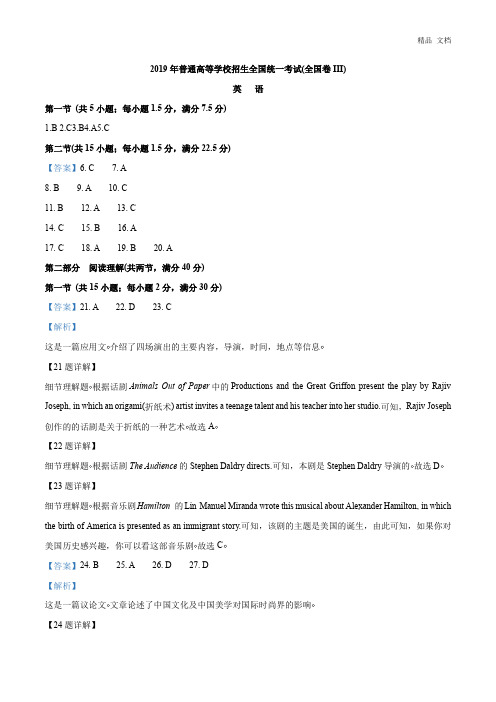
2019年普通高等学校招生全国统一考试(全国卷III)英语第一节(共5小题;每小题1.5分,满分7.5分)1.B2.C3.B4.A5.C第二节(共15小题;每小题1.5分,满分22.5分)【答案】6. C 7. A8. B 9. A 10. C11. B 12. A 13. C14. C 15. B 16. A17. C 18. A 19. B 20. A第二部分阅读理解(共两节,满分40分)第一节(共15小题;每小题2分,满分30分)【答案】21. A 22. D 23. C【解析】这是一篇应用文介绍了四场演出的主要内容,导演,时间,地点等信息【21题详解】细节理解题根据话剧Animals Out of Paper中的Productions and the Great Griffon present the play by Rajiv Joseph, in which an origami(折纸术) artist invites a teenage talent and his teacher into her studio.可知,Rajiv Joseph 创作的的话剧是关于折纸的一种艺术故选A【22题详解】细节理解题根据话剧The Audience的Stephen Daldry directs.可知,本剧是Stephen Daldry导演的故选D 【23题详解】细节理解题根据音乐剧Hamilton的Lin-Manuel Miranda wrote this musical about Alexander Hamilton, in which the birth of America is presented as an immigrant story.可知,该剧的主题是美国的诞生,由此可知,如果你对美国历史感兴趣,你可以看这部音乐剧故选C【答案】24. B 25. A 26. D 27. D【解析】这是一篇议论文文章论述了中国文化及中国美学对国际时尚界的影响【24题详解】细节理解题根据第三段中The exhibition had record attendance, showing that there is huge interest in Chinese influences.可知,此次展览吸引的参观者人数创下了记录,显示出人们对中国影响的浓厚兴趣故选B【25题详解】细节理解题根据第四段中Hill所说的话“Chinese models are the faces of beauty and fashion campaigns that sell dreams to women all over the world, which means Chinese women are not just consumers of fashion — they are central to its movement.”(中国模特是向世界各地的女性推销梦想的美丽和时尚运动的面孔,这意味着中国女性不仅仅是时尚的消费者——她们是这场运动的核心)可知,Hill说中国女性正在引领新时尚,故选A 【26题详解】词义猜测题根据下文and beating them hands down in design and sales说在设计和销售上击败他们,由此推断出上文Vera Wang, Alexander Wang, Jason Wu are taking on Galliano, Albaz, Mare Jacobs的意思是Vera Wang、Alexander Wang和Jason Wu正在与Galliano、Albaz和Mare Jacobs竞争taking on意思是“竞争”,故选D 【27题详解】主旨大意题本文通过Amanda Hill的评论,论述了中国文化、中国艺术、中国设计师等等在国际时尚中发挥着非常重要的作用因此,“中国文化刺激着国际时尚的发展和潮流”最能概括文章大意故选D【答案】28. B 29. C 30. B 31. A【解析】本文是一篇说明文文章主要讲述了面向大众的“便士报纸”的诞生历史【28题详解】细节理解题根据第一段中的In addition, most newspapers had little in them that would appeal to a mass audience. They were dull and visually forbidding.可知,在19世纪30年代之前,只有大多数报纸中几乎没有能吸引大众的内容,让人感觉无聊,视觉上令人望而却步故那时的报纸没有什么吸引力分析选项,A. Academic学术的;B. Unattractive没有吸引力,无魅力的;C. Inexpensive廉价的,不贵的;D. Confidential机密的,保密的故A、C和D是错误的,只有B符合对19世纪30年代之前的报纸的描述,故选B【29题详解】推理判断题根据第二段提到“便士报纸”针对大众,很便宜,更重要的是,在街上可以买的到报纸;再结合第三段中间的within a few years, street sales of newspapers would be commonplace in eastern cities.可知,报纸的街头销售随处可见,而且很便宜,大家都负担得起,所以街头销售意味着读报纸的人多了故选C【30题详解】细节理解题根据第二段中的The trend, then, was toward the “penny paper”—a term referring to papers madewidely available to the public.可知,这种“便士报纸”针对大众,在街上就可以买得到故选B【31题详解】推理判断题根据最后一段中The new trend of newspapers for ‘the man on the street’ did not begin well. Some of the early ventures were immediately failures. Publishers already in business, people who owners of successful papers, had little desires to change the tradition. It took a few youthful and daring businessmen to get the ball rolling.可知,“便士报纸”一开始并不好,一些早期的尝试立即失败了已经进入商业领域的成功的出版商,并不想改变这一传统后来一些年轻而大胆的商人才推动了这件事由此可推断出“便士报纸”的诞生是一个困难而曲折的过程故选A【答案】32. C 33. B 34. A 35. D【解析】这是一篇说明文哈佛医学院的一位科学家领导的研究团队发现猴子能进行基本的加法计算【32题详解】细节理解题根据第二段中A team of researchers trained three Rhesus monkeys to associate 26 clearly different symbols consisting of numbers and selective letters with 0-25 drops of water or juice as a reward.可知,在对这些猴子进行测试之前,研究人员对它们进行了培训故C项正确【33题详解】细节理解题根据第三段中的In their cages the monkeys were provided with touch screens. On one part of the screen, a symbol would appear, and on the other side two symbols inside a circle were shown. For example, the number 7 would flash on one side of the screen and the other end would have 9 and 8. If the monkeys touched the left side of the screen they would be rewarded with seven drops of water or juice; if they went for the circle, they would be rewarded with the sum of the numbers—17 in this example.可知,当猴子触摸屏幕左边时,它们会得到7滴水或者果汁的奖励;当它们触摸屏幕的另一端(即画着圆圈的部分)时,它们会得到17滴水或果汁的奖励由此可知,猴子是通过触摸屏幕得到奖励的故B项正确【34题详解】细节理解题根据第四段“the researchers noted that the monkeys would go for the higher values more than half the time, indicating that they were performing a calculation, not just memorizing the value of each combination.和第五段中的When adding two numbers, the monkeys always paid attention to the larger of the two, and then added only a fraction(小部分) of the smaller number to it.可知,猴子会在超过一半的时间内选择更高的值,这意味着它们在进行计算,而不仅仅是记住每一个组合的值所以猴子能够进行基本的加法计算故A项正确【35题详解】推理判断题通读整篇文章可知,该文介绍的是哈佛医学院的科学家Margaret Livingstone领导的一个研究团队对猴子进行实验得出的研究结果,这属于“科学研究”范畴,故该文应出现在报纸的“科学”版块故D项正确第二节(共5小题;每小题2分,满分10分)【答案】36. E 37. G 38. A 39. C 40. F【解析】本文为说明文在网络课堂上,与教授建立健康的交流模式是非常重要的,作者在文中列举了一些规矩与禁忌【36题详解】根据文章段落结构和本段首句In an online class, developing healthy patterns of communication with professors is very important.可知,在网络课堂上,与教授建立健康的交流模式是非常重要的,作者在下文中列举了一些规矩与禁忌,故E项符合语境【37题详解】根据其后一句Questions about subject content are generally welcomed.(与课程内容相关的问题是受欢迎的),解释了什么样的问题是好问题,G项“make sure they are good, thoughtful questions”与后一句相呼应,要提一些好的令人深思的问题,故选G【38题详解】根据前一句Participate in discussion forums(论坛), blogs and other open-ended forums for dialogue.可知,要参与论坛讨论、博客和其他开放式的对话论坛而这正是网络课堂采用的交流的途径,故选A【39题详解】根据本段Professors are not trained nurses, financial aid experts or your best friends.可知,教授不是训练有素的护士,不是经济援助专家,也不是你最好的朋友,所以不要分享个人信息或故事,如果他们需要更多信息的话,他们会主动问起的,故C项符合语境【40题详解】通读本段,并根据本段主题句Don’t openly express annoyance at a professor or class.告诫读者,每个人都可能曾经上过不太好的课,不要在社交媒体上攻击教授,不要公开表达对教授或班级的不满,要利用课程评价冷静地提出你的意见选项F承上启下故选F第三部分语言知识运用(共两节,满分45分)第一节(共20小题;每小题1.5分,满分30分)【答案】41. C 42. D 43. B 44. A 45. B 46. C 47. C 48. D 49. B 50. A 51.C 52. A 53.D 54. A 55. B 56. C 57. B 58. D 59. A 60. D【解析】本文是一篇记叙文,讲述北欧一个小镇长达半年没有阳光照射,为此当地政府在附近的山顶安装了一套镜子设备把阳光反射到小镇的广场,让民众享受到自然的阳光【41题详解】考查副词词义辨析A. only仅仅;B. obviously显然地;C. nearly几乎;D. precisely准确的根据前文from late September to mid-March可知,从九月底到三月中旬,差不多半年,故选C【42题详解】考查动词词义辨析A. fear害怕;B. believe相信;C. hear听见;D. notice注意根据后文We see the sky is 43 , but down in the valley it’s darker可知,我们看到天空是蓝色的,但是到山谷的时候,就会变得更暗了,故可知太阳照耀的时候,我们观察得到,故选D【43题详解】考查形容词词义辨析A. empty空的;B. blue蓝色的;C. high高的;D. wide宽的根据常识可知,有太阳的时候,天空是蓝色的,故选B【44题详解】考查形容词词义辨析A. cloudy多云的;B. normal正常的;C. different不同的;D. warm温暖的根据前文down in the valley it’s darker可知,到山谷的时候,天变暗了,像阴天一样,故选A【45题详解】考查动词词义辨析A. helped帮助;B. changed改变;C. happened发生;D. mattered关系重大根据后文可知,该镇引入一套阳光反射镜来改变这种情况,故选B【46题详解】考查名词词义辨析A. computers电脑;B. telescopes望远镜;C. mirrors镜子;D. cameras相机根据后文to reflect sunlight from neighboring peaks可知,从附近的山顶上反射太阳光,故推知为一枚镜子,故选C【47题详解】考查动词词义辨析A. remembered记得;B. forecasted预报;C. received获得,收到;D. imagined想象根据句意可知,该镇的居民获得了冬天里的第一缕阳光,故选C【48题详解】考查名词词义辨析A. repair修理;B. risk风险;C. rest休息;D. use使用根据前一句their very first ray of winter sunshine可知,获得了冬天的第一缕阳光,是由于反射板投入使用了,故选D put sth to use把某物投入使用【49题详解】考查动词词义辨析句意:这些镜子由电脑控制,指导他们整天跟着太阳的位置移动而移动,在大风的天气就自动关闭A. forbids禁止;B. directs指导,导演;C. predicts预测;D. follows跟随,追随本句描述这套系统的工作原理,电脑控制镜子的移动,故选B【50题详解】考查名词词义辨析A. day白天;B. night夜晚;C. month月;D. year年根据文章可知,太阳光出现在白天,故选A【51题详解】考查名词词义辨析A. library图书馆;B. hall大厅;C. square广场;D. street街道根据后文The town square 可知,镜子反射聚集的光会照在小镇的中心广场上,故选C【52题详解】考查动词词义辨析A. appeared出现;B. returned归还;C. faded褪去;D. stopped停止根据后文Rjukan residents gathered together可知,当光照出现的时候,居民出来,故选A【53题详解】考查动词词义辨析A. driving驾驶;B. hiding隐藏;C. camping露营;D. sitting坐根据本句and standing there 可知,光照出现的时候,人们会出来活动,坐在那里,站在那里,故选D【54题详解】考查名词词义辨析A. pictures照片,图片;B. notes笔记;C. care照顾;D. hold抓住根据文章可知,会彼此拍照,故选A【55题详解】考查形容词词义辨析A. new新的;B. full满的;C. flat平坦的;D. silent沉默的根据后文I think almost all the people in the town were there.可知,差不多全镇的人都在广场上,故可知广场全是人,故选B【56题详解】考查动词词义辨析A. block阻挡;B. avoid避免;C. enjoy喜欢,享受;D. store储存根据句意可知,并不是3500名居民都能同时享受到太阳光,故选C【57题详解】考查副词词义辨析A. Instead代替;B. However然而;C. Gradually逐渐地;D. Similarly相似地前一句意思是说并不是3500名居民都能同时享受到太阳光,后一句表达新的光线对小镇人们的意义不仅仅是提供光线,前后句属于转折关系,故选B【58题详解】考查形容词词义辨析A. nature-loving热爱自然的;B. energy-saving节能的;C. weather-beaten受风雨侵蚀的;D. sun-starved渴望阳光的根据前文可知,小镇差不多半年没有阳光,故可知小镇人们渴望阳光,故选D 【59题详解】考查形容词词义辨析A. big大的;B. clear清晰的;C. cold冷的;D. easy容易的根据前文可知,镜子反射的光线有限,范围不够大,故选A【60题详解】考查动词词义辨析A. trying尝试;B. waiting等待;C. watching观看;D. sharing分享大家一起分享就足够了,故选D第二节(共10小题;每小题1.5分,满分15分)【答案】61. so 62. to get 63. of 64. who 65. recommended 66. competition 67. traditional 68. hugely 69. were invited 70. listening【解析】这是一篇记叙文作者讲述了他们去夏威夷度假途中的经历以及到了主人家后受到的礼遇,主人热情招待他们,还在工作之余带他们参加了很多当地的活动【61题详解】考查副词句意:在我们去那座房子的路上,雨下得如此大以至于我们不能不想还要多久才能到达那里“so...that...”意为“如此……以至于……”,固定句型故填so【62题详解】考查固定搭配本句运用了take...to do sth.,意为“花费……做某事”,故此处应填to get【63题详解】考查介词“a pack of”意为“一群……”故填of【64题详解】考查定语从句句意:它们被他们的主人训练地很好,它们的主人在照顾这些动物方面很有经验先行词为masters(主人),且从句缺主语故关系词填who【65题详解】考查一般过去时句意:我们的主人跟我们分享了很多他们的经历并推荐了一些很好的吃饭、购物和参观的地方“and”前后两个动作“shared”与“recommended”是并列关系,时态一致故填recommeded【66题详解】考查名词由空格前的不定冠词an与空格后的不定式to watch可以确定空格处应该填名词形式故填competition【67题详解】考查形容词空格修饰名词stories,应用形容词形式,tradition的形容词为traditional,故填traditional【68题详解】考查副词空格处修饰形容词popular,应用副词形式,huge的副词为hugely,故填hugely【69题详解】考查一般过去时的被动语态句意:我们被邀请去参加一场私人音乐会由“on the last day of our week-long stay”可知,句子时态为一般过去时,用被动语态主语为we,故填were invited【70题详解】考查非谓语动词本句谓语动词为“were invited”,所以空格处动词listen应用非谓语动词形式听音乐这个动作是由we发出的,所以选用现在分词形式也可由and前后连接两个并列的结构这一规律解题,and后meeting interesting locals为分词形式,故空格处填listening第四部分写作(共两节,满分35分)第一节短文改错(共10小题;每小题1分,满分10分)【答案】opens→openrequired→requiresordinarily→ordinarycafe后面加上to去掉likeyourselves→themselveswhat→that/whichmanage→managingcity→citiesan→a【解析】【分析】这是一篇记叙文,本文讲述了作者的梦想是开咖啡馆【详解】1. 考查不定式的用法不定式作表语,to后用动词原形故把opens改为open2. 考查动词的时态短文的主体时态都是现在时,故把required改为requires3. 考查形容词的用法修饰名词cafe,应用形容词,ordinarily是副词故把ordinarily改为ordinary4. 考查动词的固定搭配want sb to do sth想要某人做某事故在have前加to5. 考查介词的用法such as和like都是用来举例子,重复了故把like删除6. 考查代词的用法customers是句子的主语,故把yourselves改为themselves7. 考查定语从句先行词environment在从句中作主语,指物,关系代词用that/which故把what改为that/which8. 考查固定短语succeed in doing something意为“成功做了某事”,是固定短语故把manage改为managing9. 考查名词单复数many different后跟可数名词的复数形式故把city改为cities10. 考查冠词的用法an用在元音音素前,a用在辅音因素前unique是以辅音音素开头的单词,前用a故把an改为a第二节书面表达(满分25分)【答案】Dear Allen,How is everything going? Our school will hold a music festival next Sunday morning in the school hall. And I’m writing to invite you to join us.The opening ceremony will start at 9:00 am, and the schoolmaster will deliver a speech. Then there will be various fantastic performances played by talented students. You are definitely welcome to show up on stage, which will add color and fun to our festival.Looking forward to your early reply.Best wishes,Li Hua 【解析】【分析】今年的书面表达要求考生写邮件,告知英国朋友音乐节的情况【详解】首先确定提纲先介绍写作目的,之后介绍音乐节的时间、活动安排等具体信息,最后欢迎他表演节目第二,根据提纲,确定关键词语,如:How is everything going? a music festival,in the school hall,The opening ceremony等第三,注意选用合适的连接词将各要点串联起来【点睛】本文内容完整,详略得当并使用了高级句式如:You are definitely welcome to show up on stage, which will add color and fun to our festival.定语从句提升了文章档次。
2021年高考英语03 (新课标全国卷)-试题版

2021年普通高等学校招生全国统一考试英语预测模拟卷(三)(新课标全国卷I、卷II、卷III)第一部分听力(共两节,满分30分)第一节(共5小题;每小题1.5分,满分7.5分)听下面5段对话。
每段对话后有一个小题,从题中所给的A、B、C三个选项中选出最佳选项。
听完每段I 对话后,你都有10秒钟的时间来回答有关小题和阅读下一小题。
每段对话仅读一遍。
1.What’s John doing now?A.Playing football.B. Watching TV.C. Studying.2.What can the man do?A.Swim.B. Play soccer.C. Play basketball.3.When will the meeting be over?A. At 11:00.B. At 10:00.C. At 9:30.4.What does the woman think of the play?A.Terrible.B. Just so-so.C. Great.5.What’s the weather like now?A.Snowy.B. Rainy.C. Sunny.第二节(共15小题;每小题1.5分,满分22.5分)听下面5段对话或独白。
每段对话或独白后有几个小题,从题中所给的A、B、C三个选项中选出最佳选项。
听每段对话或独白前,你将有时间阅读各个小题,每小题5秒钟;听完后,各小题将给出5秒钟的作答时间。
每段对话或独白读两遍。
听第6段材料,回答第6、7题。
6.Where does the man want to go?A.The library.B. The lab.C. The café.7.What’s the man’s major?A.Psychology.B. Physics.C. Chemistry.听下面一段对话,回答第8 至第10 三个小题。
2019年全国统一高考英语试卷(新课标ⅲ)(含解析版)真题全国卷三3III有答案
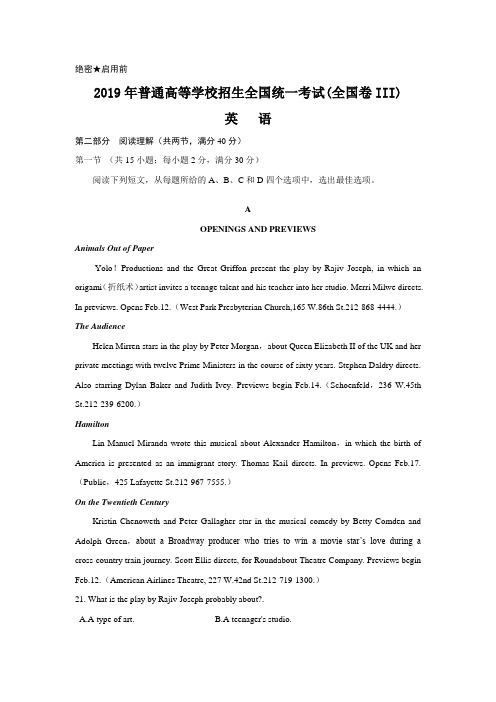
"China is impossible to overlook," says Hill. "Chinese models are the faces of beauty and fashion campaigns that sell dreams to women all over the world, which means Chinese women are not just consumers of fashion — they are central to its movement. "Of course, only are today's top Western designers being influenced by China — some of the best designers of contemporary fashion are themselves Chinese." Vera Wang, Alexander Wang, Jason Wu aretaking onGaliano, Albaz, Marc Jacobs-and beating them hands down in design and sales," adds Hill.
2020年高考英语全国三卷(精校+精析)
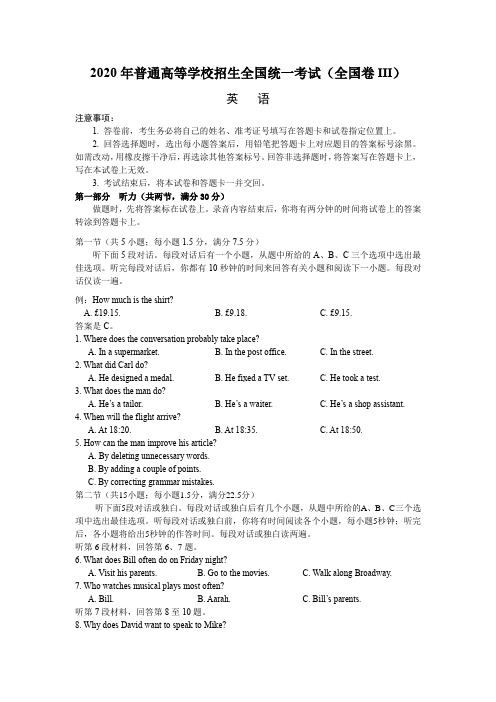
2020年普通高等学校招生全国统一考试(全国卷III)英语注意事项:1. 答卷前,考生务必将自己的姓名、准考证号填写在答题卡和试卷指定位置上。
2. 回答选择题时,选出每小题答案后,用铅笔把答题卡上对应题目的答案标号涂黑。
如需改动,用橡皮擦干净后,再选涂其他答案标号。
回答非选择题时,将答案写在答题卡上,写在本试卷上无效。
3. 考试结束后,将本试卷和答题卡一并交回。
第一部分听力(共两节,满分30分)做题时,先将答案标在试卷上。
录音内容结束后,你将有两分钟的时间将试卷上的答案转涂到答题卡上。
第一节(共5小题;每小题1.5分,满分7.5分)听下面5段对话。
每段对话后有一个小题,从题中所给的A、B、C三个选项中选出最佳选项。
听完每段对话后,你都有10秒钟的时间来回答有关小题和阅读下一小题。
每段对话仅读一遍。
例:How much is the shirt?A. £19.15.B. £9.18.C. £9.15.答案是C。
1. Where does the conversation probably take place?A. In a supermarket.B. In the post office.C. In the street.2. What did Carl do?A. He designed a medal.B. He fixed a TV set.C. He took a test.3. What does the man do?A. He’s a tailor.B. He’s a waiter.C. He’s a shop assistant.4. When will the flight arrive?A. At 18:20.B. At 18:35.C. At 18:50.5. How can the man improve his article?A. By deleting unnecessary words.B. By adding a couple of points.C. By correcting grammar mistakes.第二节(共15小题;每小题1.5分,满分22.5分)听下面5段对话或独白。
2017年新课标全国卷3高考英语试题及答案[2]
![2017年新课标全国卷3高考英语试题及答案[2]](https://img.taocdn.com/s3/m/c2d105dfa6c30c2258019ea8.png)
(完整word版)2017年新课标全国卷3高考英语试题及答案(word版可编辑修改) (完整word版)2017年新课标全国卷3高考英语试题及答案(word版可编辑修改)编辑整理:尊敬的读者朋友们:这里是精品文档编辑中心,本文档内容是由我和我的同事精心编辑整理后发布的,发布之前我们对文中内容进行仔细校对,但是难免会有疏漏的地方,但是任然希望((完整word版)2017年新课标全国卷3高考英语试题及答案(word版可编辑修改))的内容能够给您的工作和学习带来便利。
同时也真诚的希望收到您的建议和反馈,这将是我们进步的源泉,前进的动力。
本文可编辑可修改,如果觉得对您有帮助请收藏以便随时查阅,最后祝您生活愉快业绩进步,以下为(完整word版)2017年新课标全国卷3高考英语试题及答案(word版可编辑修改)的全部内容。
(完整word版)2017年新课标全国卷3高考英语试题及答案(word版可编辑修改)绝密★启用前2017 年普通高等学校招生全国统一考试英语(考试时间:120 分钟试卷满分:150分)注意事项:1.答卷前,考生务必将自己的姓名、准考证号填写在答题卡上。
3.回答选择题时,选出每小题答案后,用铅笔把答题卡上对应题目的答案标号涂黑。
如需改动,用橡皮擦干净后,再选涂其他答案标号。
回答非选择题时,将答案写在答题卡上,写在本试卷上无效.3.考试结束后,将本试卷和答题卡一并交回。
第一部分听力(共两节,满分30 分)做题时,先将答案标在试卷上,录音结束后,你将有两分钟的时间将试卷上的答案转涂到答题卡上.第一节(共 5 小题,每小题 1.5 分,满分7。
5 分)听下面 5 段对话,每段对话后有一个小题,从题中所给的A、B、C 三个选项中选出最佳答案。
听完每段对话后,你都有10 秒钟的时间来回答有关小题和阅读下一小题。
每段对话仅读一遍。
例: How much is the shirt?A.£19。
15. B.£9.18。
- 1、下载文档前请自行甄别文档内容的完整性,平台不提供额外的编辑、内容补充、找答案等附加服务。
- 2、"仅部分预览"的文档,不可在线预览部分如存在完整性等问题,可反馈申请退款(可完整预览的文档不适用该条件!)。
- 3、如文档侵犯您的权益,请联系客服反馈,我们会尽快为您处理(人工客服工作时间:9:00-18:30)。
2016年普通高等学校全国统一考试(新课标全国卷III)英语注意事项:本试卷分第I卷(选择题)和第II卷(非选择题)两部分。
考试结束后.将本试卷和答题卡一并交回。
第I卷注意事项:1.答第I卷前,考考生务必将自己的姓名、考生号填写在答题卡上。
2.选出每小题答案后,用铅笔把答题卡上对应的题目的答案标号涂黑。
如需改动,用橡皮擦干净后,在选涂其他答案标号。
不能答在本试卷,否则无效。
第一部分阅读理解(共两节,满分40分)第一节(共15小题;每小题2分,满分30分)阅读下列短文,从每题所给的四个选项(A、B、C和D)中,选出最佳选项,并在答题卡上将该项涂黑。
AMusicOpera at Music Hall: 1243 Elm Street. The season runs June through August, with additional performances in March and September. The Opera honors Enjoy the Arts membership discounts. Phone: 241-2742. .Chamber Orchestra: The Orchestra plays at Memorial Hall at 1406 Elm Street, which offers several concerts from March through June. Call 723-1182 for more information. http:// Symphony Orchestra: At Music Hall and Riverbend. For ticket sales, call 381-3300. Regular season runs September through May at Music Hall in summer at Riverbend. .College Conservatory of Music (CCM): Performances are on the main campus(校园) of the university, usually at Patricia Cobbett Theater. CCM organizes a variety of events, including performances by the well-known LaSalle Quartet, CCM’s Philharmonic Orchestra, and various groups of musicians presenting Baroque through modern music. Students with I.D. cards can attend the events for free. A free schedule of events for each term is available by calling the box office at 556-4183. .edu/events/calendar.Riverbend Music Theater: 6295 Kellogg Ave. Large outdoor theater with the closest seats under cover (price difference).Big name shows all summer long! Phone:232-6220. .1. Which number should you call if you want to see an opera?A. 241-2742.B. 723-1182.C. 381-3300.D. 232-6220.2. When can you go to a concert by Chamber Orchestra?A. February.B. May.C. August.D. November.3.Where can students go for free performances with their I.D. cards?A. Music Hall.B. Memorial Hall.C. Patricia Cobbett Theater.D. Riverbend Music Theater.4. How is Riverbend Music Theater different from the other places?A. It has seats in the open air.B. It gives shows all year round.C. It offers membership discounts.D. It presents famous musical works.BOn one of her trips to New York several years ago, Eudora Welty decided to take a couple of New York friends out to dinner. They settled in at a comfortable East Side cafe and within minutes, another customer was approaching their table.“Hey, aren’t you from Mississippi?” the elegant, white-haired writer remembered being asked by the stranger. “I’m from Mississippi too.”Without a second thought, the woman joined the Welty party. When her dinner partner showed up, she also pulled up a chair.“They began telling me all the news of Mississippi,”Welty said. “I didn’t know what my New York friends were thinking.”Taxis on a rainy New York night are rarer than sunshine. By the time the group got up to leave, it was pouring outside. Welty’s new friends immediately sent a waiter to find a cab. Heading back downtown toward her hotel, her big-city friends were amazed at the turn of events that had changed their Big Apple dinner into a Mississippi.“My friends said: ‘Now we believe your stories,’” Welty added. “And I said: ‘Now you know.These are the people that make me write them.’”Sitting on a sofa in her room, Welty, a slim figure in a simple gray dress, looked pleased with this explanation.“I don’t make them up,” she said of the characters in her fiction these last 50 or so years. “I don’t have to.”Beauticians, bartenders, piano players and people with purple hats, Welty’s people come from afternoons spent visiting with old friends, from walks through the streets of her native Jackson, Miss., from conversations overheard on a bus. It annoys Welty that, at 78, her left ear has now given out. Sometimes, sitting on a bus or a train, she hears only a fragment(片段) of a particularly interesting story.5. What happened when Welty was with her friends at the cafe?A. Two strangers joined her.B. Her childhood friends came in.C. A heavy rain ruined the dinner.D. Some people held a party there.6. The underlined word “them” in Paragraph 6 refers to Welty’s .A. readersB. partiesC. friendsD. stories7. What can we learn about the characters in Welty’s fiction?A. They live in big cities.B. They are mostly women.C. They come from real life.D. They are pleasure seekers.CIf you are a fruit grower—or would like to become one—take advantage of Apple Day to see what’s around. It’s called Apple Day but in practice it’s more like Apple Month. The day itself is on October 21, but since it has caught on, events now spread out over most of October around Britain.Visiting an apple event is a good chance to see, and often taste, a wide variety of apples. To people who are used to the limited choice of apples such as Golden Delicious and Royal Gala in supermarkets, it can be quite an eye opener to see the range of classical apples still in existence,such as Decio which was grown by the Romans. Although it doesn’t taste of anything special, it’s still worth a try, as is the knobbly(多疙瘩的) Cat’s Head which is more of a curiosity than anything else.There are also varieties developed to suit specific local conditions. One of the very best varieties for eating quality is Orleans Reinette, but you’ll need a warm, sheltered place with perfect soil to grow it, so it’s a pipe dream for most apple lovers who fall for it.At the events, you can meet expert growers and discuss which ones will best suit your conditions, and because these are family affairs, children are well catered for with apple-themed fun and games.Apple Days are being held at all sorts of places with an interest in fruit, including stately gardens and commercial orchards(果园).If you want to have a real orchard experience, try visiting the National Fruit Collection at Brogdale, near Faversham in Kent.8.What can people do at the apple events?A. Attend experts’ lectures.B. Visit fruit-loving families.C. Plant fruit trees in an orchard.D. Taste many kinds of apples.9.What can we learn about Decio?A. It is a new variety.B. It has a strange look.C. It is rarely seen now.D. It has a special taste.10. What does the underlined phrase “a pipe dream” in Paragraph 3mean?A. A practical idea.B. A vain hope.C.A brilliant plan.D. A selfish desire.11.What is the aut hor’s p urpose in writing the text?A. To show how to grow apples.B .To introduce an apple festival.C. To help people select apples.D. To promote apple research.DBad news sells. If it bleeds, it leads. No news is good news, and good news is no news. Those are the classic rules for the evening broadcasts and the morning papers. But now that information is being spread and monitored(监控) in different ways, researchers are discovering new rules. Bytracking people’s e-mails and online posts, scientists have found that good news can spread faster and farther than disasters and sob stories.“The ‘if it bleeds’ rule works for mass media,” says Jonah Berger, a scholar at the University of Pennsylvania. “They want your eyeballs and don’t care how you’re feelin g. But when you share a story with your friends, you care a lot more how they react. You don’t want them to think of you as a Debbie Downer.”Researchers analyzing word-of-mouth communication—e-mails, Web posts and reviews, face-to-face conversations—found that it tended to be more positive than negative(消极的), but that didn’t necessarily mean people preferred positive news. Was positive news shared more often simply because people experienced more good things than bad things? To test for that possibility, Dr. Berger looked at how people spread a particular set of news stories: thousands of articles on The New York Times’ website. He and a Penn colleague analyzed the “most e-mailed” list for six months. One of his first findings was that articles in the science section were much more likely to make the list than non-science articles. He found that science amazed Times’ readers and made them want to share this positive feeling with others.Readers also tended to share articles that were exciting or funny, or that inspired negative feelings like anger or anxiety, but not articles that left them merely sad. They needed to be aroused(激发) one way or the other, and they preferred good news to bad. The more positive an article, the more likely it was to be share d, as Dr. Berger explains in his new book, “Contagious: Why Things Catch On.”12 .What do the classic rules mentioned in the text apply to?A. News reports.B. Research papers.C .Private e-mails. D. Daily conversations.13. What can we infer about people like Debbie Downer?A. They’re socially inactive.B. They’re good at telling stories.C. They’re inconsiderate of others.D. They’re careful with their words.14.Which tended to be the most e-mailed according to Dr. Berger’s research?A . Sports new. B. Science articles.C. Personal accounts.D. Financial reviews.15 .What can be a suitable title for the text?A. Sad Stories Travel Far and WideB .Online News Attracts More PeopleC. Reading Habits Change with the TimesD. Good News Beats Bad on Social Networks第二节(共5小题;每小题2分,满分10分)根据短文内容,从短文后的选项中选出能填入空白处的最佳选项。
